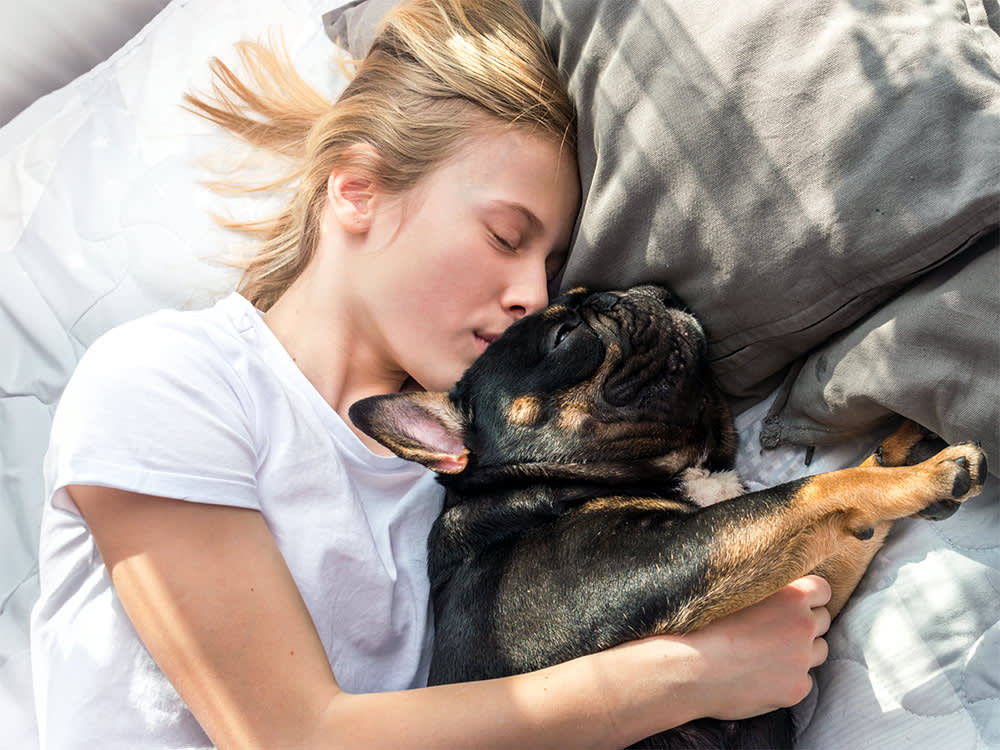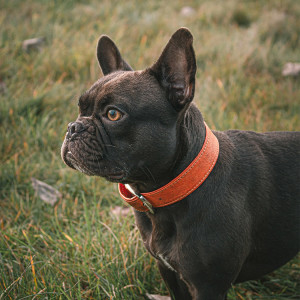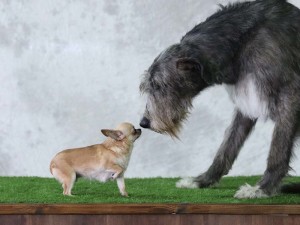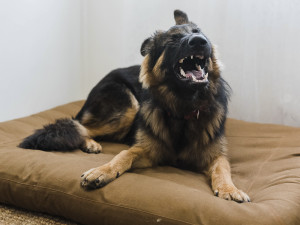A New Study Finds Flat-Faced Dogs Get Pretty Crappy Sleep
It’s one of several health problems facing brachycephalic breeds.

share article
Flat-faced dogs are showstoppers, no doubt — there’s something about all those wrinkles and snorts that pause passersby in their tracks to “ooh” and “aah” at the adorable little gremlins. In 2022, the French Bulldog surpassed the Labrador Retriever as the most popular dog breed in Americaopens in a new tab — clearly, they’re a popular pick. But as vets have been pointing out for years now, those iconic, squishy features come at a price.
Flat-faced breeds (also known as brachycephalic breeds) suffer from a variety of health problems resulting from their breeding. A new study published in opens in a new tab finds that shortened skulls cause disrupted sleep — which, as anyone who hasn’t gotten their eight hours can attest, can lead to a host of other issues.
The sleeping habits of flat-faced dogs
Researchers took electroencephalogram (EEG) measurements while dogs were sleeping by placing non-invasive electrodes on their heads. They left the dogs, along with their pet parents, in a darkened room with a mattress and a rug and allowed the dogs to make their own sleeping choices.
Researchers found that flat-faced dogs showed increased delta waves, decreased beta waves, and a higher frequency of spindles during sleep, which is a pattern “associated with low intelligence in humans.” This kind of sleep is also associated with a loss of white matter — which allows different areas of the brain to communicate opens in a new tab— in humans.
They also found that flat-faced dogs spent more time in rapid eye movement (REM) sleep than non-REM (this is unusual because in humans, the first two stages of non-REM sleep are longest). Typically, REM durations decrease as mammals progress in their development; this has been proven in humans, dogs, and rats. “Our results concerning (relative) sleep duration and the ratio of REM to non-REM sleep in turn lend some support to the hypothesis of brachycephalic dogs having more juvenile brains,” the study reports.
Researchers also noticed that brachycephalic breeds spent more time sleeping. They concluded that “the sleep apnea these breeds usually suffer from increases daytime sleepiness.”
What to expect if you adopt a flat-faced dog
Researchers still have some time before they know exactly how brachycephalic breeds’ sleep habits affect their health, but it’s possible that their poor sleep can lead to cognitive difficulties. Sleep is far from the only issue facing flat-faced dogs, too.
“Dogs with brachycephalic syndrome have really small nostrils and a really long soft palate that hangs back and obstructs the airways,” Dr. Jamie Freyer, a veterinarian and manager of data and veterinary genetics at Wisdom Health, told The Wildestopens in a new tab in August 2022. “So, they are breathing in air through a small opening, and then when the breath gets to the back of their throat, it reaches another obstacle, which makes breathing in general hard. And that difficulty breathing can, in part, lead to concerns around heat stroke, heart problems, and other issues.”
Dr. Freyer urges adopters of flat-faced dogs to know their pups may have more health concerns than a typical dog. “In my experience seeing brachycephalic patients, a lot of pet parents are unaware of the number of health issues these breeds can have and are surprised by the expense and time needed to care for them,” Dr. Freyer said. “If you’re thinking about getting a certain breed — any breed — it’s really important to do your research. Prepare yourself for potential health problems and understand what you’re getting into as it relates to the breed’s day-to-day care.”
References:

Sio Hornbuckle
Sio Hornbuckle is a writer living in New York City with their cat, Toni Collette.
Related articles
![Cavalier King Charles Spaniel's eye is examined on the bed by a person]() opens in a new tab
opens in a new tabDogs Get Dry Eye Too...Some Breeds More Than Others
Eyes without tears are only for Cameron Diaz in The Holiday.
![An English bulldog resting on a floor.]() opens in a new tab
opens in a new tabDo English Bulldogs Face Extinction?
One of the most popular breeds in the world is also one of the least genetically diverse, causing huge implications for the breed.
![Chihuahua dog meets an Irish Wolfhound]() opens in a new tab
opens in a new tabDo Dogs Know How Big They Are?
Research indicates yes, so why is your large pup still laying on top of you?
- opens in a new tab
Reverse Sneezing in Dogs: Causes and Treatment
Don’t panic: It’s called reverse sneezing, and in most cases, it’s nothing to worry about.
![Woman lying in bed with two golden retrievers]() opens in a new tab
opens in a new tab13 Reasons to Sleep with Your Dog
It’s science (and adorable).






